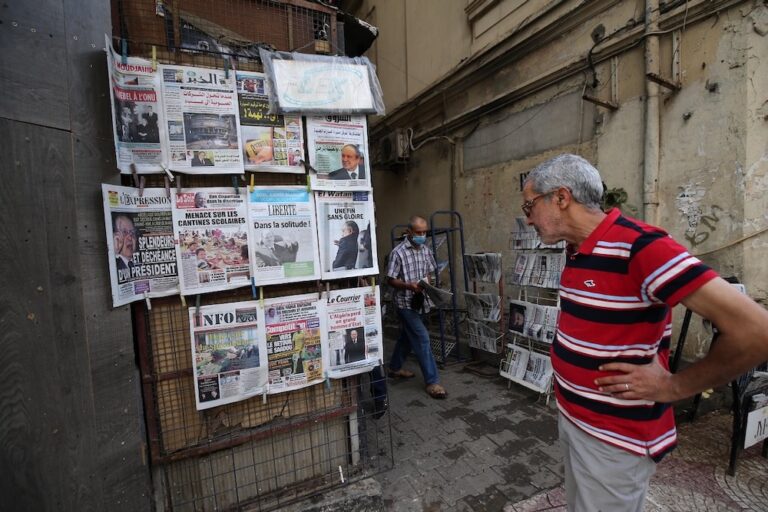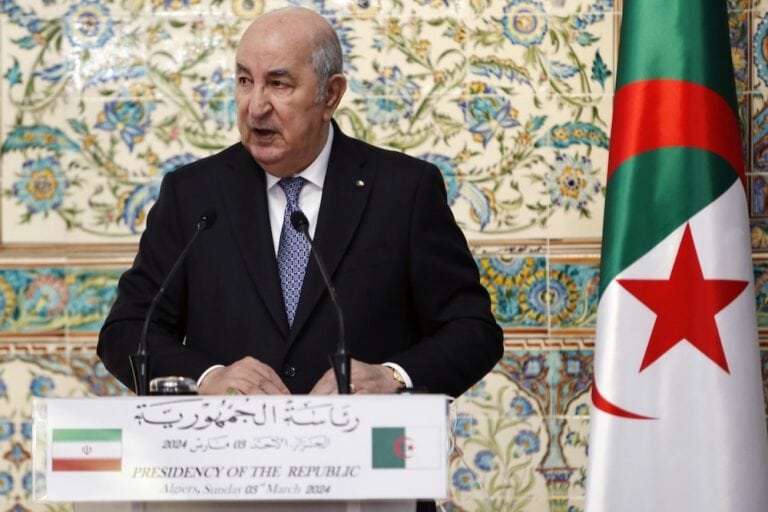Authorities have blocked demonstrations, arbitrarily arrested trade unionists, and prosecuted some of them on criminal charges which appear to have little basis in fact or are based on the peaceful exercise of their union activities.
Algerian authorities have increasingly clamped down on efforts to form independent unions and to organize and participate in peaceful protests and worker strikes. Authorities have blocked demonstrations, arbitrarily arrested trade unionists, and prosecuted some of them on criminal charges which appear to have little basis in fact or are based on the peaceful exercise of their union activities.
Most recently, on September 29, 2013, the police violently dispersed a peaceful protest organized by the Contractual Workers Union in front of the government compound in Algiers and arrested 20 people, then released them later in the day.
“Algeria claims to be on a path to political reform, but then it turns around and menaces independent unions that seek social justice and better job conditions,” said Joe Stork, acting Middle East and North Africa director at Human Rights Watch. “Workers should not have to risk being fired or thrown in prison for participating in peaceful union activities.”
The result of the crackdown has been a climate of intimidation and fear that inhibits the development of independent trade unions alongside the existing state-supported unions, Human Rights Watch said. Human Rights Watch interviewed 20 union activists about the tactics the authorities use to curtail union activities during strikes, peaceful protests or indoor gatherings. Authorities have dismissed government workers after peaceful strikes and imprisoned union leaders on politically motivated charges. Algerian authorities should stop putting obstacles in the way of independent unions, Human Rights Watch said.
On April 25, Human Rights Watch sent a letter to the Algerian ministers of justice and interior requesting information about specific incidents and cases in which it appeared that authorities had violated the right of trade unionists and workers to engage in peaceful union activities. More than five months later, the ministers have not replied.
Algerian authorities engage in administrative maneuvers designed to withhold legal status from independent unions. The law on legalizing new unions requires these groups only to notify the authorities that they exist, not to get permission to form. But authorities sometimes refuse to issue a receipt proving they have been notified.
The Union of Higher Education Teachers in Solidarity (Syndicat des Enseignants du Supérieur Solidaires), for example, filed its papers on January 19, 2012. But it received no receipt at the time and has yet to receive an answer from the government, which means it cannot legally operate.
The National Autonomous Union of Postal Workers (Syndicat National Autonome des Postiers – SNAP) notified the authorities three times – on July 2, 2012, on September 13, 2012, and on March 3, 2013 – but the authorities never issued a receipt. The union still lacks legal status.
The rights to freedom of association, collective bargaining, and to strike are enshrined in International Labour Organization (ILO) conventions, to which Algeria is a party. Algeria also has obligations under the African Charter on Human and Peoples’ Rights and the International Covenant on Civil and Political Rights (ICCPR), which guarantee the right to freedom of association and assembly, and under the International Covenant on Economic Social and Cultural Rights (ICESCR), which protects specific rights related to freedom of association and trade union membership.
Article 2 of ILO Convention 87 on the right to freedom of association and protection of the right to organize, stipulates that workers and employers, without distinction, shall have the right to establish and, subject only to the rules of the organization concerned, to join organizations of their own choosing without previous authorization.
“Algeria’s largest workers’ union, the General Union of Algerian Workers, played a proud role in Algeria’s independence a half-century ago,” Stork said. “It is long past the time for Algeria to allow other unions to flourish too.”
Background
Since its independence from France in 1962 until the 1990s, Algeria had only one workers’ union, the General Union of Algerian Workers (Union Générale des travailleurs algériens, UGTA), which many historians describe as playing a crucial role during Algeria’s war of independence, from 1954 to 1962. Following widespread riots and protests in October 1988 that shook the government, Algeria adopted a new constitution, paving the way for legislation that ended the ruling National Liberation Front’s monopoly over political life, media, and organized labor, and allowing for greater freedom of expression, assembly, and association.
On June 2, 1990, Algeria adopted Law 90-14, allowing for the establishment of independent unions. Several autonomous unions were created in the public sector, such as the Autonomous National Union of Public Administration Personnel (Syndicat National Autonome des personnels de l’administration publique – SNAPAP), and the National Autonomous Union of Education and Training Workers (Syndicat autonome des travailleurs de l’éducation et de la formation – SATEF).
Law 90-14 requires new unions to register by sending the authorities a declaration announcing their establishment. The declaration must contain the list of the founding members and the administrative committee members of the union as well as their signatures, their personal status, their profession, and home address; and two certified copies of the bylaws of the union and the minutes of its founding general assembly. The law states that the governor or the labor minister must deliver a receipt (récépissé) acknowledging the constitution of the union within 30 days.
Restrictions on Establishing Unions
In practice, authorities have curtailed the right to form an independent union in various ways.
Refusal to deliver the receipt for the registration of the unions
Authorities often refused to deliver the receipt, thus depriving the union of legal recognition and the ability to operate legally.
In addition to the unions that have tried to register recently, with no response, the National Union of Vocational Training Workers submitted its founding papers in 2002 and heard nothing for years. It got its receipt only in 2011, after the ILO’s Committee on Freedom of Association made inquiries to the Algerian authorities about it.
Obstacles to forming federations and confederations
Article 2 of Law no. 90-14, says that workers and employers from the same professions, branches or sectors of activity have the right to form unions. Authorities have interpreted that provision as prohibiting the formation of confederations or federations that unite workers from different sectors.
Authorities used this argument to reject the request by the National Autonomous Union of Public Administration Staff (Syndicat National Autonome des personnels de l’administration publique – SNAPAP) in 2001 to form the National Autonomous Union of Algerian Workers (Syndicat national autonome des travailleurs algeriens).
In an opinion dated October 17, 2001, the ILO stated that Algerian legislation should not be interpreted to prevent unions from forming federations and confederations, and called on Algerian authorities to end restrictions and obstacles to their formation.
Other obstacles
Authorities also sometimes contend that the union’s bylaws don’t conform with the law. The Higher Education Teachers’ Union (SESS) said that the government replied to its January 2012 submission that “an examination of the trade union’s bylaws shows that they are inconsistent with the provisions of Act No. 90-14 of 2 June 1990” without providing further details.
Kaddour Chouicha, the union’s national coordinator, said that during meetings with the Labor Ministry, the ministry representatives asked the union representatives to change the bylaws. They did and resubmitted their papers, to no avail.
The National Autonomous Union of Workers of the SONELGAZ (Société Nationale de l’Electricité et du Gaz/National Society for Electricity and Gas), which submitted its founding papers on June 14, 2012, received the same reply, without elaboration.
The two organizations submitted complaints to the Freedom of Associations Committee of the ILO. The committee concluded that, “Generally speaking, recalling that the applications for registration were filed more than one year ago in one case, the committee can only express its concerns as regards what clearly constitutes lengthy delays to register trade unions and a violation of the right of workers to establish organizations of their own choosing.”
The committee recommended that Algerian authorities expedite registration of these unions, but the unions have still not received the receipts from the government, which keeps asking them to change their bylaws.
Arbitrary Interference with Union Activities
On February 20, 2013, the police arrested and expelled 10 non-Algerian members of associations of unemployed workers in other Maghreb countries who had traveled to Algiers to attend the first Maghreb Forum for the Fight Against Unemployment and Temporary Work (Forum maghrébin pour la lutte contre le chômage et le travail précaire) that was to take place on February 20 and 21 at the labor union center in the Bab Ezzouar neighborhood of Algiers. They were held at the Bab Ezzouar police station, then taken to the airport, where the five Tunisians and three Mauritanians among them were expelled on the same day and the two Moroccans on the following day.
Rachid Malaoui, the president of the public administration union, told Human Rights Watch that very early on February 20, the police surrounded the labor union center and blocked access to the meeting room. The police arrested Mourad Tchiko of the public administration union and Abdelkader Kherba of the National Committee for the Defense of Rights of Unemployed (Comité National de Défense des droits des Chômeurs – CNDDC), which is affiliated with the union, held them until that evening, then released them without charge.
Authorities had already summarily shut down an earlier public administration union headquarters in 2009. The union had rented the building in Bachdjarrah, a suburb of Algiers, from a private citizen and made it regularly available to organizations for events, turning it into a locus of civil society activities in greater Algiers.
The order to close the building down immediately came just before the union was to hold the North African Unions Forum (Forum Syndical Maghrebin) there, on May 14 and 15, 2009. The written order signed by the security chief (préfet) of the wilaya of Algiers listed the reasons for the closure as: holding gatherings and public meetings without first obtaining permission to do so; inviting foreigners to participate in gatherings without informing or seeking the necessary authorization from the relevant agencies; transforming the premises into a meeting place for young men and women coming from different regions of the country; and disturbances of the public order caused by persons on the premises.
Harassment and Intimidation of Union Leaders
Members of unions that consider themselves autonomous from the General Union of Algerian Workers (Union générale des travailleurs algériens – UGTA) told Human Rights Watch that the authorities have subjected them to judicial harassment and arbitrary arrests in reprisal for their peaceful union activities and demonstrations for labor rights.
The ILO’s Committee on Freedom of Association, which examines complaints about violations of freedom of association, has affirmed in its case law that the right to strike “is a right that workers and their organizations (trade unions, federations, and confederations) are entitled to enjoy,” that any restrictions on this right “should not be excessive,” and that the “legitimate exercise of the right to strike should not entail prejudicial penalties of any sort, which would imply acts of anti-union discrimination.”
Several union activists told Human Rights Watch that they faced retaliation for organizing or participating in strikes. They said they complied with laws outlining the steps that they must take before calling a strike. These include exhausting mechanisms for mediation and conciliation under Article 24 of the labor union law, notifying the employer eight days in advance and ensuring a minimum level of service during the strike. Article 33 of the law prohibits sanctions against workers for participating in a legal strike.
Tchiko, of the SNAPAP, described intimidation and judicial harassment against him, beginning in 2004. Tchiko, who lives in Algiers, belongs to the union’s national bureau and is a former vice president of the National Union of Civil Protection Personnel (Union nationale des agents de la protection civile).
On December 18, 2004, Tchiko organized and participated in a sit-in in front of the National Direction of Civil Protection in Algiers to demand an investigation of corruption in this administration and improvements in working conditions. Civil Protection suspended him from his job the same day. On February 12, 2005, a disciplinary commission ordered his reassignment to a Civil Protection job in another town outside of Algiers governorate because of his participation in the sit-in.
In April 2005, Tchiko said, the court of Bir Mourad Rais in Algiers charged him with “hampering the services of a public administration” and organizing an “unauthorized gathering.” Tchiko has been suspended from his job without pay, pending a verdict in the case. He said that authorities have not let him see his own judicial file. After eight years, the Court of Bir Mourad Rais decided on October 10, 2012 to acquit him from all charges. Tchiko has attempted since that date to reintegrate his previous work and sent a notification to his former administration informing them about the judicial decision. However, he is still suspended from his job.
Mourad Ghedia, president of the National Federation of Justice Sector Workers (Federation nationale des travailleurs du secteur de la justice, affiliated with SNAPAP), said that his federation decided to organize a strike in April 2012 to demand better working conditions for law clerks. But the administration imposed restrictions on the union leaders, and harassed and intimidated them. Ghedia said the federation had complied with the legislation on strikes and sent a strike notice to the authorities on March 31, 2012, for a strike set to begin on April 10.
Ghedia said that the administration sanctioned 17 of the striking court clerks for “dereliction of duties” and “lack of diligence in work” and reassigned them to other courts far from their homes. Immediately after the strike, authorities dismissed 57 law clerks, including six from the executive bureau of the federation, bypassing the usual mechanisms for initiating a disciplinary dismissal, Ghedia said. He said they cannot appeal their dismissal since they lack any formal notification and cannot return to work since the court administration physically bars them.
Saad Bourekba, a member of the National Federation of Justice Sector Workers, was one of the leaders of the April 2012 strike in Sétif. He worked as an information technician in the first instance court of that city. On July 1, 2012, Bourekba received a summons from the investigating judge of the Setif court, informing him that he was accused of disrupting the internet network of the court where he works. The judge also informed Bourekba that he was placing him under judicial supervision and that he had to sign in at a police station three times a week.
On October 16, the judge told Bourekba he was charged under Penal Code article 394bis with fraudulently accessing an automated data processing system. Bourekba denied the charge and said that the real motive was to punish him for was his union activities. Since July 1, 2012, Bourekba has been suspended from his job without pay. He was sentenced on June 17 to a year in prison, of which 10 months were suspended.
Yassine Zaid, a human rights and union activist, has faced intimidation and harassment since he became involved in the activities of independent unions, including the public administration union. Zaid said that on October 2, 2012, he was on a bus to Ouargla to meet with oil company workers. At a checkpoint 20 kilometers away, the police stopped the bus and checked the passengers’ papers.
Zaid said they took him off the bus and to a police station, where they slapped him in the face several times and then detained him for a week. On October 8, they took him before Ouargla’s Court of First Instance on charges of assaulting and insulting a police officer under articles 144 and 148 of the Penal Code. The court sentenced him to six months in prison, suspended. He appealed the decision on October 16 and is still awaiting the appeals trial.
Amine Sidhoum, Zaid’s lawyer, said that a witness to Zaid’s questioning by police told Sidhoum that three policemen questioned Zaïd for about two hours, striking him on the face and neck, while he was handcuffed. Zaid said he filed a complaint after his release before the public prosecutor of the First Instance Tribunal of Ouargla for mistreatment, but the prosecution office did not initiate any case against the police officers.
In one of the most recent examples of judicial harassment against union leaders, Abdelkader Kherba, a member of the National Committee to Defend the Rights of the Unemployed (Comité national pour la défense des droits des chômeurs – CNDDC) was sentenced on May 6, 2013 to two months in prison, and fined 20,000 dinars (approximately US$250).
The Appeal Court of the city of Médéa, about 80 kilometers southwest of Algiers, convicted Kherba under Law 12-06 relating to Associations, which came into force in January 2012. Article 46 subjects active members of unregistered associations to prison terms ranging from three to six months. Kherba was earlier prosecuted and sentenced to one year in prison, suspended, on charges of “direct incitement to an unarmed gathering” and “interfering with the work of an institution” because he was filming the sit-in of court clerks, who had been on strike for 10 days to demand better working conditions for court personnel.


